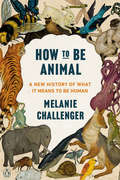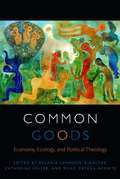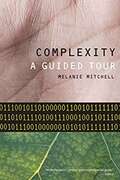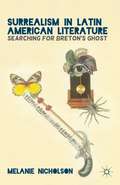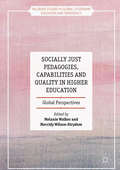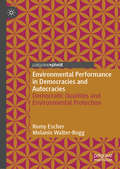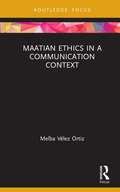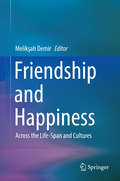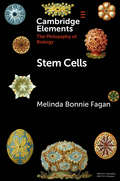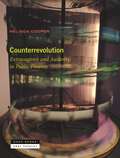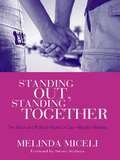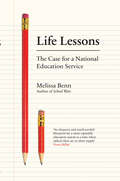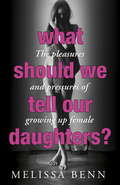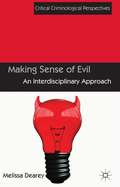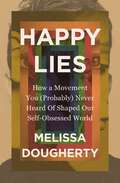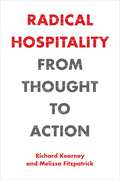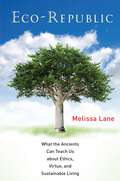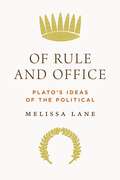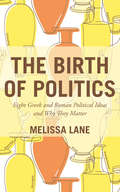- Table View
- List View
How to Be Animal: A New History of What It Means to Be Human
by Melanie ChallengerWhat makes us human, and why are we so sure we're different from other animals?Humans are the most inquisitive, emotional, imaginative, aggressive, and baffling animals on the planet. But how well do we really know ourselves? How to Be Animal rewrites the remarkable human story and argues that at the heart of our psychology is a profound struggle with being animal.Most of our effects on the planet are the consequences of technological improvements and advances in our understanding of natural mechanisms. But why did this cognitive and technological edge come about in the first place and what kind of being has it made us? In How to Be Animal, Challenger brilliantly argues that this dizzying trajectory is the result of a singular characteristic of our species: the struggle with being an animal. Using a combination of memoir, historical texts, interweaving interviews and cultural and environmental history, How to Be Animal is lively and thought-provoking, bursting with ideas. This is a book for anyone who has ever contemplated what humans are and what makes our species so simultaneously brilliant and awful. Even more so, it is a book that asks tantalizing philosophical questions, such as whether and how human life matters. How to Be Animal is a tough-minded but ultimately sympathetic portrait of humanity. It exposes human beings as extraordinary animals defined by a profound struggle. In the third millennium, the way humans respond to being an animal among animals is the greatest and most inspiring challenge we face.
Common Goods: Economy, Ecology, and Political Theology (Transdisciplinary Theological Colloquia)
by Melanie Johnson-DeBaufre, Catherine Keller, and Elias Ortega-AponteIn the face of globalized ecological and economic crises, how do religion, the postsecular, and political theology reconfigure political theory and practice? As the planet warms and the chasm widens between the 1 percent and the global 99, what thinking may yet energize new alliances between religious and irreligious constituencies?This book brings together political theorists, philosophers, theologians, and scholars of religion to open discursive and material spaces in which to shape a vibrant planetary commons. Attentive to the universalizing tendencies of “the common,” the contributors seek to reappropriate the term in response to the corporate logic that asserts itself as a universal solvent. In the resulting conversation, the common returns as an interlinked manifold, under the ethos of its multitudes and the ecology of its multiplicity.Beginning from what William Connolly calls the palpable “fragility of things,” Common Goods assembles a transdisciplinary political theology of the Earth. With a nuance missing from both atheist and orthodox religious approaches, the contributors engage in a multivocal conversation about sovereignty, capital, ecology, and civil society. The result is an unprecedented thematic assemblage of cosmopolitics and religious diversity; of utopian space and the time of insurrection; of Christian socialism, radical democracy, and disability theory; of quantum entanglement and planetarity; of theology fleshly and political.
Complexity: A Guided Tour
by Melanie MitchellWhat enables individually simple insects like ants to act with such precision and purpose as a group? How do trillions of neurons produce something as extraordinarily complex as consciousness? In this remarkably clear and companionable book, leading complex systems scientist Melanie Mitchell provides an intimate tour of the sciences of complexity, a broad set of efforts that seek to explain how large-scale complex, organized, and adaptive behavior can emerge from simple interactions among myriad individuals. Based on her work at the Santa Fe Institute and drawing on its interdisciplinary strategies, Mitchell brings clarity to the workings of complexity across a broad range of biological, technological, and social phenomena, seeking out the general principles or laws that apply to all of them. <p><p>Richly illustrated, Complexity: A Guided Tour--winner of the 2010 Phi Beta Kappa Book Award in Science--offers a wide-ranging overview of the ideas underlying complex systems science, the current research at the forefront of this field, and the prospects for its contribution to solving some of the most important scientific questions of our time.
Surrealism in Latin American Literature
by Melanie NicholsonCharting surrealism in Latin American literature from its initial appearance in Argentina in 1928 to the surrealist-inspired work of several writers in the 1970s, Melanie Nicholson argues that surrealism has exercised a significant and positive influence over twentieth-century Latin American literature, particularly poetry.
Socially Just Pedagogies, Capabilities and Quality in Higher Education
by Melanie Walker Merridy Wilson-StrydomThis book explores the idea that teaching and learning - pedagogy - at universities is a crucial space for students' formation as ethical graduates, equipped with knowledge, skills and values to contribute to more equal societies. We know that universities across the globe do not stand apart from social and educational inequalities at multiple levels; they have the potential to reproduce or reduce social inequalities and therefore towards transformative ends. This book suggests how this could be achieved both via policy and practice around the globe
Environmental Performance in Democracies and Autocracies: Democratic Qualities and Environmental Protection
by Romy Escher Melanie Walter-RoggThere are considerable differences in environmental performance and outcomes across both democracies and autocracies, but there is little understanding of how levels of democracy and autocracy influence environmental performance. This book examines whether analysing the effects of individual democratic features separately can contribute to a better understanding of cross-national variance in environmental performance. The authors show that levels of social equality in particular, as well as the strength of local and regional democracy, contribute significantly to explaining cross-national variation in environmental performance. On the other hand, a high level of political corruption affects a country’s ability to adopt and implement environmental policies effectively. In exploring the inter-relationship between democratic qualities, political corruption, and environmental performance, this book presents policymakers and political theorists with a clear picture of which aspects of democratic societies are most conducive to producing a better environment.
Maatian Ethics in a Communication Context (Routledge Focus on Communication Studies)
by Melba Vélez OrtizMaatian Ethics in a Communication Context explores the ethical principle of Maat: the guiding principle of harmony and order that permeated classical African political and civil life. The book provides a rigorous, communication-focused account of the ethical wisdom ancient Africans cultivated and is evidenced in the form of recovered written texts, mythology, stelae, prescriptions for just speech, and the hieroglyphic system of writing itself. Moving beyond colonial stereotypes of ancient Africans, the book offers insight into the African value systems that positioned humans as inextricably embedded in nature, and communication theory that anchors good communication in careful listening habits as the foundational moral virtue. Expanding on the work of Maulana Karenga, Molefi Kete Asante and other groundbreaking scholars, the book presents a picture of civilizations with a shared lust for life, a spiritual connection to scientific speech, and the veneration of ancestors as deeply connected to the pursuit of wisdom. Offering an examination of Maat from a specifically communication ethics perspective, this book will be of great interest to scholars and students of Communication Ethics, African philosophy, Rhetorical theory, Africana Studies and Ancient History.
Friendship and Happiness
by Melikşah DemirThis is the first book that explicitly focuses on the relationships between various types of friendship experiences and happiness. It addresses historical, theoretical, and measurement issues in the study of friendship and happiness (e. g. , why friends are important for happiness). In order to achieve a balanced evaluation of this area as a whole, many chapters in the book conclude with a critical appraisal of what is known about the role of friendship in happiness, and provide important directions for future research. Experts from different parts of the world provide in-depth, authoritative reviews on the association between different types of friendship experiences (e. g. , friendship quantity, quality) and happiness in different age groups and cultures. An ideal resource for researchers and students of positive psychology, this rich, clear, and up-to-date book serves as an important reference for academicians in related fields of psychology such as cross-cultural, developmental and social.
Stem Cells (Elements in the Philosophy of Biology)
by Melinda Bonnie FaganWhat is a stem cell? The answer is seemingly obvious: a cell that is also a stem, or point of origin, for something else. Upon closer examination, however, this combination of ideas leads directly to fundamental questions about biological development. A cell is a basic category of living thing; a fundamental 'unit of life.' A stem is a site of growth; an active source that supports or gives rise to something else. Both concepts are deeply rooted in biological thought, with rich and complex histories. The idea of a stem cell unites them, but the union is neither simple nor straightforward. This book traces the origins of the stem cell concept, its use in stem cell research today, and implications of the idea for stem cell experiments, their concrete results, and hoped-for clinical advances.
Counterrevolution: Extravagance and Austerity in Public Finance
by Melinda CooperA thorough investigation of the current combination of austerity and extravagance that characterizes government spending and central bank monetary policyAt the close of the 1970s, government treasuries and central banks took a vow of perpetual self-restraint. To this day, fiscal authorities fret over soaring public debt burdens, while central bankers wring their hands at the slightest sign of rising wages. As the brief reprieve of coronavirus spending made clear, no departure from government austerity will be tolerated without a corresponding act of penance.Yet we misunderstand the scope of neoliberal public finance if we assume austerity to be its sole setting. Beyond the zero-sum game of direct claims on state budgets lies a realm of indirect government spending that escapes the naked eye. Capital gains are multiply subsidized by a tax system that reserves its greatest rewards for financial asset holders. And for all its airs of haughty asceticism, the Federal Reserve has become adept at facilitating the inflation of asset values while ruthlessly suppressing wages. Neoliberalism is as extravagant as it is austere, and this paradox needs to be grasped if we are to challenge its core modus operandi.Melinda Cooper examines the major schools of thought that have shaped neoliberal common sense around public finance. Focusing, in particular, on Virginia school public choice theory and supply-side economics, she shows how these currents produced distinct but ultimately complementary responses to the capitalist crisis of the 1970s. With its intellectual roots in the conservative Southern Democratic tradition, Virginia school public choice theory espoused an austere doctrine of budget balance. The supply-side movement, by contrast, advocated tax cuts without spending restraint and debt issuance without guilt, in an apparent repudiation of austerity. Yet, for all their differences, the two schools converged around the need to rein in the redistributive uses of public spending. Together, they drove a counterrevolution in public finance that deepened the divide between rich and poor and revived the fortunes of dynastic wealth.Far-reaching as the neoliberal counterrevolution has been, Cooper still identifies a counterfactual history of unrealized possibilities in the capitalist crisis of the 1970s. She concludes by inviting us to rethink the concept of revolution and raises the question: Is another politics of extravagance possible?
Standing Out, Standing Together: The Social and Political Impact of Gay-Straight Alliances
by Melinda MiceliJust a decade ago, requests by students to establish groups to support gay and lesbian students were rare and generally met with shock and confusion by school administrators and local communities. Today there are more than 1600 gay straight alliances (GSAs) across the country. Standing Out, Standing Together documents the emergence of gay straight alliances in public schools across America - from factors that have contributed to the relatively rapid spread of GSA to those that stirred controversy and posed roadblocks. Using over 10 years of interviews with students, teachers, administrators and political activists; case studies; and local and national media reports, Miceli explores the personal and political stakes involved in the battles over GSAs. Although the book acknowledges and documents the harassment, abuse and problems suffered by many gay, lesbian, transgendered, and bisexual students, its primary focus is on these students as political activists, rather than as passive victims, making it a unique contribution to sociologists, educators, political activists and LGBTreaders alike.
Levinas and Analytic Philosophy: Second-Person Normatvity and the Moral Life (Routledge Research in Phenomenology)
by Michael Fagenblat Melis ErdurThis volume examines the relevance of Emmanuel Levinas’s work to recent developments in analytic philosophy. Contemporary analytic philosophers working in metaethics, the philosophy of mind, and the metaphysic of personal identity have argued for views similar to those espoused by Levinas. Often disparately pursued, Levinas’s account of "ethics as first philosophy" affords a way of connecting these respective enterprises and showing how moral normativity enters into the structure of rationality and personal identity. In metaethics, the volume shows how Levinas’s moral phenomenology relates to recent work on the normativity of rationality and intentionality, and how it can illuminate a wide range of moral concepts including accountability, moral intuition, respect, conscience, attention, blame, indignity, shame, hatred, dependence, gratitude and guilt. The volume also tests Levinas’s innovative claim that ethical relations provide a way of accounting for the irreducibility of personal identity to psychological identity. The essays here contribute to ongoing discussions about the metaphysical significance and sustainability of a naturalistic but nonreductive account of personhood. Finally, the volume connects Levinas’s second-person standpoint with analogous developments in moral philosophy.
Life Lessons: The Case for a National Education Service
by Melissa BennA radical agenda to make our education system fit for the twenty-first centuryOur education system has been damaged by politicians who have arrogantly imposed a regime of market-driven reforms. It is time to reframe education as an essential public good, one arising from a hunger to find more engaging ways to learn and the powerful imperative to make our society genuinely equal.In this timely and provocative essay, Melissa Benn argues for a National Education Service. Like the NHS, the NES would provide the framework for a life-long entitlement to education: from early-years provision to apprenticeships, universities and adult education. It should be free at the point of delivery. It should nurture teachers and scholarship, moving beyond an obsession with exam results to create fully rounded, questioning citizens. Its eventual aim should be an integrated, comprehensive system available to all.
What Should We Tell Our Daughters?: The Pleasures and Pressures of Growing Up Female
by Melissa BennWe have reached a tricky crossroads in modern women's lives and our collective daughters are bearing the brunt of some intolerable pressures. Although feminism has made great strides forward since our mothers' and grandmothers' day, many of the key issues - equality of pay, equality in the home, representation at senior level in the private, public and political sectors - remain to be tackled. Casual sexism in the media and in everyday life is still rife and our daughters face a host of new difficulties as they are bombarded by images of unrealistically skinny airbrushed supermodels, celebrity role-models who depend on their looks and partners for status, and by competitive social media. The likes of Natasha Walter and Katie Roiphe deal with feminism from an adult point of view, but our daughters need to be prepared for stresses that are coming into play now as early as pre-school. This is a manifesto for every mother who has ever had to comfort a daughter who doesn't feel 'pretty', for every young woman who out-performs her male peers professionally and wonders why she is still not taken seriously, and for anyone interested in the world we are making for the next generation.
What Should We Tell Our Daughters?: The Pleasures and Pressures of Growing Up Female
by Melissa BennWe have reached a tricky crossroads in modern women's lives and our collective daughters are bearing the brunt of some intolerable pressures. Although feminism has made great strides forward since our mothers' and grandmothers' day, many of the key issues - equality of pay, equality in the home, representation at senior level in the private, public and political sectors - remain to be tackled. Casual sexism in the media and in everyday life is still rife and our daughters face a host of new difficulties as they are bombarded by images of unrealistically skinny airbrushed supermodels, celebrity role-models who depend on their looks and partners for status, and by competitive social media. The likes of Natasha Walter and Katie Roiphe deal with feminism from an adult point of view, but our daughters need to be prepared for stresses that are coming into play now as early as pre-school. This is a manifesto for every mother who has ever had to comfort a daughter who doesn't feel 'pretty', for every young woman who out-performs her male peers professionally and wonders why she is still not taken seriously, and for anyone interested in the world we are making for the next generation.
Making Sense of Evil
by Melissa DeareyWhen it comes to crime, everyone seems to take evil seriously as an explanatory concept - except criminologists. This book asks why, and why not, through exploring a variety of interdisciplinary approaches to evil from the perspectives of theology, philosophy, literary and cultural studies, and the social sciences.
Happy Lies: How a Movement You (Probably) Never Heard Of Shaped Our Self-Obsessed World
by Melissa DoughertyIn this groundbreaking book, popular apologist Melissa Dougherty helps us understand how our society got to be so toxically subjective, why endless positivity is inherently destructive, and how we can live with faithful truth and genuine love in these self-obsessed times.Melissa Dougherty skillfully diagnoses the issue and provides the cure: the authentic and life-giving truth of the Christian worldview. - Wesley HuffHave you ever wondered how we ended up in a world where personal feelings could become the authority for reality? Or why so many of us are on a relentless pursuit for happiness yet somehow feel more exhausted and sadder than ever? You're not alone.Melissa deftly traces the roots of today's social chaos back to a little-known (but very influential) 1800s philosophy known as New Thought. A former follower of its teachings, Melissa provides clarity and compassion mixed with a dash of loving snark as she exposes New Thought's deceptions and its many concerning tendrils within the church and our "self-help" culture.You'll be shocked, grieved, and encouraged as you learn:How you can experience true freedom, hope, and peace instead of the world's counterfeitsHow an anti-God ideology so easily hijacked Christian-sounding ideasWhy thinking positively is entirely different from the unbiblical and burdensome "positive thought" movementWhy fake "authenticity" short-circuits real redemptionHow understanding the New Thought mindset can help us share our faith more effectively Uncover a dangerous ideology that nearly everyone has met, yet few of us can name, in order to better understand our culture and joyfully live faithful to the gospel that is so much better than our world's Happy Lies.
Radical Hospitality: From Thought to Action (Perspectives in Continental Philosophy)
by Richard Kearney Melissa FitzpatrickRadical Hospitality addresses a timely and challenging subject for contemporary philosophy: the ethical responsibility of opening borders, psychic and physical, to the stranger. Kearney and Fitzpatrick show how radical hospitality happens by opening oneself in narrative exchange to someone or something other than ourselves—by crossing borders, whether literal or figurative. Against the fears, dogmas, and demands for certainty and security that push us toward hostility, we also desire to wager with the unknown, leap into the unanticipated, and celebrate the new, a desire this book seeks to recognize and cultivate. The book contends that hospitality means chancing one’s hand, one’s arm, one’s very self, thereby opening a vital space for new voices to be heard, shedding old skins, and welcoming new understandings.Radical Hospitality engages with urgent moral conversations concerning identity, nationality, immigration, commemoration, and justice, moving between theory and praxis and on to the formative life of the classroom. Building on key critical debates on the question of hospitality ranging from phenomenology, hermeneutics and deconstruction to neo-Kantian moral critique and Anglo-American virtue ethics, the book explores novel possibilities for an ethics of hospitality in our contemporary world of border anxiety, refugee crises, and ecological catastrophe.
Love Italian Style: The Secrets of My Hot and Happy Marriage
by Melissa GorgaReal Housewives of New Jersey star Melissa Gorga shows you how to love your man and keep him happy, satisfied, faithful, and devoted to you. What you see is what you get with Melissa Gorga. On Real Housewives of New Jersey, she's that beautiful, ambitious woman with a successful career who puts her family first. In fact, her stable yet sexy marriage to lovable Joe is a welcome antidote to the constant fighting and backbiting on the show. Despite the pressure of life in the spotlight, she makes marriage look easy. How does she do it? Melissa's overriding principle: Treat your husband like a king! And in return, you'll be treated like a queen! In Love Italian Style, Melissa shares her (and his) secrets to relationship success-generations-tested old-fashioned values served up with a modern, sexy twist. To her, the four tenets to a happy marriage are respect, honesty, loyalty, and passion (underscore passion). By sharing her and Joe's life together-from the story of their first date to how they still keep it hot in the bedroom a decade later-Melissa admits that, yes, marriage has been a lot of work, but the rewards are ten-fold. With her time-tested strategies, you can "Gorganize" your own relationship, strengthen your bond, and amp up the passion for lifelong bliss. Some of Melissa's how-to's:· Dress to impress your man. Flirt with your hubby. ·Cook Italian style. Fight right. Keep the romance alive and the home fires burning. Raise little princes and princesses.This playful guidebook promises to make any marriage better-the Gorga way!
We All Have Different Abilities
by Melissa HigginsWhat can you do? Tie your shoes? Play piano? Everyone has different talents and abilities. Let's share and celebrate our many talents
Eco-Republic: What the Ancients Can Teach Us about Ethics, Virtue, and Sustainable Living (Peter Lang Ltd Ser. #23)
by Melissa LaneAncient lessons for sustainable citizenshipAn ecologically sustainable society cannot be achieved without citizens who possess the virtues and values that will foster it, and who believe that individual actions can indeed make a difference. Eco-Republic draws on ancient Greek thought—and Plato's Republic in particular—to put forward a new vision of citizenship that can make such a society a reality. Melissa Lane develops a model of a society whose health and sustainability depend on all its citizens recognizing a shared standard of value and shaping their personal goals and habits accordingly. Bringing together the moral and political ideas of the ancients with the latest social and psychological theory, Lane illuminates the individual's vital role in social change, and articulates new ways of understanding what is harmful and what is valuable, what is a benefit and what is a cost, and what the relationship between public and private well-being ought to be.Eco-Republic reveals why we must rethink our political imagination if we are to meet the challenges of climate change and other urgent environmental concerns. Offering a unique reflection on the ethics and politics of sustainability, the book goes beyond standard approaches to virtue ethics in philosophy and current debates about happiness in economics and psychology. Eco-Republic explains why health is a better standard than happiness for capturing the important links between individual action and social good, and diagnoses the reasons why the ancient concept of virtue has been sorely neglected yet is more relevant today than ever.
Of Rule and Office: Plato's Ideas of the Political
by Melissa LaneA constitutionalist reading of Plato&’s political thoughtPlato famously defends the rule of knowledge. Knowledge, for him, is of the good. But what is rule? In this study, Melissa Lane reveals how political office and rule were woven together in Greek vocabulary and practices that both connected and distinguished between rule in general and office as a constitutionally limited kind of rule in particular. In doing so, Lane shows Plato to have been deeply concerned with the roles and relationships between rulers and ruled. Adopting a longstanding Greek expectation that a ruler should serve the good of the ruled, Plato&’s major political dialogues—the Republic, the Statesman, and Laws—explore how different kinds of rule might best serve that good. With this book, Lane offers the first account of the clearly marked vocabulary of offices at the heart of all three of these dialogues, explaining how such offices fit within the broader organization and theorizing of rule.Lane argues that taking Plato&’s interest in rule and office seriously reveals tyranny as ultimately a kind of anarchy, lacking the order as well as the purpose of rule. When we think of tyranny in this way, we see how Plato invokes rule and office as underpinning freedom and friendship as political values, and how Greek slavery shaped Plato&’s account of freedom. Reading Plato both in the Greek context and in dialogue with contemporary thinkers, Lane argues that rule and office belong at the center of Platonic, Greek, and contemporary political thought.
Politeia in Greek and Roman philosophy
by Melissa Lane Verity HarteThis is the first exploration of how ideas of politeia (constitution) structure both political and extra-political relations throughout the entirety of Greek and Roman philosophy, ranging from Presocratic to classical, Hellenistic, and Neoplatonic thought. A highly distinguished international team of scholars investigate topics such as the Athenian, Spartan and Platonic visions of politeia, the reshaping of Greek and Latin vocabularies of politics, the practice of politics in Plato and Proclus, the politics of value in Plato, Aristotle and the Stoics, and the extension of constitutional order to discussions of animals, gods and the cosmos. The volume is dedicated to Professor Malcolm Schofield, one of the world's leading scholars of ancient philosophy.
The Birth of Politics: Eight Greek and Roman Political Ideas and Why They Matter
by Melissa LaneIn The Birth of Politics, Melissa Lane introduces the reader to the foundations of Western political thought, from the Greeks, who invented democracy, to the Romans, who created a republic and then transformed it into an empire. Tracing the origins of our political concepts from Socrates to Plutarch to Cicero, Lane reminds us that the birth of politics was a story as much of individuals as ideas. Scouring the speeches of lawyers alongside the speculations of philosophers, and the reflections of ex-slaves next to the popular comedies and tragedies of the Greek and Roman stages, this book brings ancient ideas to life in unexpected ways. Lane shows how the Greeks and Romans defined politics with distinctive concepts, vocabulary, and practices—all of which continue to influence politics and political aspirations around the world today. She focuses on eight political ideas from the Greco-Roman world that are especially influential today: justice, virtue, constitution, democracy, citizenship, cosmopolitanism, republic, and sovereignty. Lane also describes how the ancient formulations of these ideas often challenge widely held modern assumptions—for example, that it is possible to have political equality despite great economic inequality, or that political regimes can be indifferent to the moral character of their citizens. A stimulating introduction to the origins of our political ideas and ideals, The Birth of Politics demonstrates how much we still have to learn from the political genius of the Greeks and Romans.
The Birth of Politics: Eight Greek and Roman Political Ideas and Why They Matter
by Melissa LaneIn The Birth of Politics, Melissa Lane introduces the reader to the foundations of Western political thought, from the Greeks, who invented democracy, to the Romans, who created a republic and then transformed it into an empire. Tracing the origins of our political concepts from Socrates to Plutarch to Cicero, Lane reminds us that the birth of politics was a story as much of individuals as ideas. Scouring the speeches of lawyers alongside the speculations of philosophers, and the reflections of ex-slaves next to the popular comedies and tragedies of the Greek and Roman stages, this book brings ancient ideas to life in unexpected ways. Lane shows how the Greeks and Romans defined politics with distinctive concepts, vocabulary, and practices--all of which continue to influence politics and political aspirations around the world today. She focuses on eight political ideas from the Greco-Roman world that are especially influential today: justice, virtue, constitution, democracy, citizenship, cosmopolitanism, republic, and sovereignty. Lane also describes how the ancient formulations of these ideas often challenge widely held modern assumptions--for example, that it is possible to have political equality despite great economic inequality, or that political regimes can be indifferent to the moral character of their citizens. A stimulating introduction to the origins of our political ideas and ideals, The Birth of Politics demonstrates how much we still have to learn from the political genius of the Greeks and Romans.
